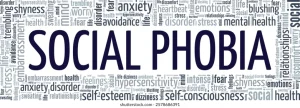Introduction
Social phobia symptoms can seriously impact your daily life, relationships, and career. Also known as social anxiety disorder, this condition involves a persistent fear of being judged or embarrassed in social settings. Understanding the early signs is crucial to seeking timely help. In this post, we’ll explore the 7 powerful social phobia symptoms you should never ignore.

If you need professional support, consulting the best psychiatrist in Delhi can provide valuable insights and personalized strategies for Phobias. Consider Visiting:
What Are Social Phobia Symptoms?
Social phobia symptoms refer to a range of emotional, behavioral, and physical signs that indicate a person may be experiencing intense anxiety in social or performance situations. These symptoms can lead to avoidance of everyday tasks, such as talking to people, eating in public, or participating in meetings.
According to the National Institute of Mental Health (NIMH), this condition is more than just shyness—it’s a serious mental health disorder that can be treated with the right support.
1. Intense Fear in Social Situations
One of the most common social phobia symptoms is an overwhelming fear of interacting with others. This fear goes beyond basic nervousness—it may feel paralyzing and lead to total avoidance of conversations, meetings, or even walking into a room with people.
2. Avoidance of Crowds and Group Activities
Individuals with social phobia often avoid crowded places or group activities. They may decline invitations, skip classes or work, or even avoid going to the store. This symptom limits social and professional opportunities, creating a cycle of isolation.
3. Visible Physical Reactions
Another key social phobia symptom is experiencing physical discomfort during social events. This includes:
-
Sweating
-
Blushing
-
Shaking
-
Rapid heartbeat
-
Nausea
-
Muscle tension
These reactions reinforce the fear, making future interactions even more stressful.
4. Worrying for Days Before an Event
Anticipatory anxiety is one of the more debilitating social phobia symptoms. A person may start stressing about an upcoming event days or even weeks in advance, imagining the worst-case scenarios and fearing negative judgment.

5. Fear of Rejection or Criticism
Low self-esteem and hypersensitivity to criticism are also common symptoms of social phobia. Individuals often assume others will reject or mock them, even in neutral or supportive settings. This thought pattern holds them back from social or career growth.
6. Overthinking Social Interactions
People with social phobia may replay every interaction in their head afterward, analyzing what they said, how they looked, or whether they were judged. This can lead to shame, regret, and increased fear of future interactions.
7. Difficulty with Public Speaking or Presentations
Perhaps one of the most recognizable social phobia symptoms is a fear of public speaking. Even reading aloud or introducing oneself in a group can feel terrifying, often resulting in a shaky voice, dry mouth, or even complete mental blocks.
How Social Phobia Affects Daily Life
Unchecked social phobia symptoms can interfere with education, employment, and relationships. It often leads to social isolation and can contribute to other mental health conditions such as depression. The CDC provides general mental health resources to help understand how these conditions affect well-being.
When to Seek Help
If you notice multiple social phobia symptoms impacting your life, it may be time to seek support from a licensed mental health professional. Early intervention can prevent symptoms from escalating.
Trusted sources for support:

Conclusion
Recognizing and understanding social phobia symptoms is the first step toward reclaiming control over your life. These 7 powerful signs can help you or someone you care about take that important step toward healing. Don’t let social anxiety define your life—support and recovery are possible.
Living with social phobia can affect everything from your academic and career performance to your personal relationships. Simple day-to-day interactions that others take for granted—like attending meetings, making phone calls, or even stepping into a public place—can become extremely distressing. But no one should have to live in constant fear of being judged or rejected.